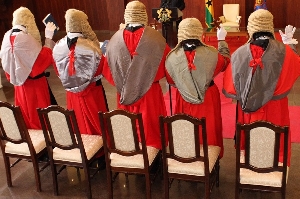Feature Article by Nana Akyea Mensah, The Odikro.
THE PLANT BREEDERS' BILL IS IRREVOCABLE
We seriously need to do everything in our power to pressure Parliament to drop the UPOV-compliant Plant Breeders' Bill currently under consideration. We have very little time left! They are debating today, and may vote by the end of the month! This law downgrades Ghana as an independent state. For instance, Clause 23 asks Parliament to evacuate their sacred role of taking measures to ensuring the safety of Ghanaians to unelected faceless foreign business executives of giant multinational corporations of doubtful intentions and bad track records.
What makes this law so special is that, once it is passed, its effects are irreversible. Intellectual Property or IP-protection rules come under the control of the World Trade Organisation (WTO). We may have the right to pass the law, but we will lose any right to repeal or even amend it later on. This Bill, once passed, can never be revoked. According to the WTO rules, even if a Least Developed Country, LDC , introduces a TRIPS-compliant obligation on IP-protection, it would no longer be able to reduce that scope of protection, regardless of the fact that the LDC is not required to implement the Trade Related Aspects of Intellectual Property Rights - TRIPS Agreement.
The only justification for this is in the Memorandum to the Plant Breeders' Bill, 2013, by the Attorney General and Minister of Justice, which states:
"The Trade Related Aspects of Intellectual Property Rights (TRIPS) which resulted from the negotiations of the Uruguay Round requires contracting parties to protect varieties either by patent or by an effective sui generic system of protection or by a hybrid of these two systems which is the plant breeders rights system. The plant breeder rights system permits farmers to save and replant seed and provides them with the right to use protected varieties as a source of further research and breeding activities.
Ghana in compliance with her international obligations has passed six pieces of legislation in the area of intellectual property between 2003 and 2006. The legislation enacted include Patents Act, 2003 (Act 657)," See: MEMORANDUM by MARIETTA BREW APPIAH-OPONG (MRS.), Attorney-General and Minister responsible for Justice, Date: 28th May, 2013. http://foodsovereigntyghana.org/plant-breeders-bill/
WHAT DOES “UPOV 91 COMPLIANT” MEAN?
“UPOV 91 compliant” means in agreement with the requirement for compliance with the International Convention for the Protection of New Varieties of Plants of 19th March, 1991. The Memorandum accompanying the Bill explains:
“Clause 1 of the Bill defines the scope of application of the Bill. Ghana has opted to apply the requirement for compliance with the International Convention for the Protection of New Varieties of Plants of December 2, 1961 and subsequently revised on November 10th, 1972, on 23rd October, 1978 and on 19th March, 1991.” See: MEMORANDUM to the Plant Breeders Bill currently before our Parliament which UPOV considers to be compatible with the UPOV 91 Convention, by MARIETTA BREW APPIAH-OPONG (MRS.) Attorney-General and Minister responsible for Justice, Date: 28th May, 2013. http://www.parliament.gh/assets/file/Bills/Ghana%20Plant%20Breeders%20Bill%202013.pdf
WHAT IS UPOV?
The International Union for the Protection of New Varieties of Plants or UPOV takes its abbreviation from the French: Union internationale pour la protection des obtentions végétales. UPOV is an intergovernmental organization established by the International Convention for the Protection of New Varieties of Plants, with headquarters in Geneva, Switzerland. The Convention was adopted in Paris in 1961 and revised in 1972, 1978 and 1991. The objective of the Convention is the protection of new varieties of plants by intellectual property rights. See: International Union for the Protection of New Varieties of Plants - Wikipedia, the free encyclopedia: http://en.wikipedia.org/wiki/International_Union_for_the_Protection_of_New_Varieties_of_Plants
The mission of UPOV is to provide and promote an effective system of plant variety protection, with the aim of encouraging the development of new varieties of plants, for the benefit of society.”
The benefit of this is also stated: “The UPOV Convention provides the basis for members to encourage plant breeding by granting breeders of new plant varieties an intellectual property right: the breeder's right.” See: UPOV // Web Presentation - UPOV http://www.upov.int/overview/en/upov.html
Ghana does not necessarily need to be UPOV-compliant in order to satisfy the WTO regulations. The Attorney General and Minister of Justice is clearly misleading Parliament into an irrevocable trap. On Plant varieties. This is what the WTO TRIPS agreement states: “Members shall provide for the protection of plant varieties either by patents or by an effective sui generis system or by any combination thereof."
WHAT MODEL SHOULD GHANA ADOPT?
Experts from civil society groups are saying putting in place a patent system for plant varieties is simply not advisable because the patent system gives monopoly/exclusive rights to the patent holder and once a patent claim is made farmers will have no possibility of using in any way the patented invention. So most countries tend to protect plant varieties through a system of plant varieties protection. The TRIPS Agreement leaves it to each member to design the unique system for plant variety protection.
One model is UPOV 1991. But most developing countries including major countries such as China, Brazil, South Africa, Kenya are not members of UPOV 1991 but are members of UPOV 1978 which is a more flexible regime than UPOV 1991. Even some developed countries such as Norway and Canada are not members of UPOV 1991. A majority of the members of UPOV 1991 are industrialised countries. http://www.upov.int/export/sites/upov/members/en/pdf/pub423.pdf.
New members that join UPOV can only join UPOV 1991. They cannot join UPOV 1978. That is why if Ghana joins UPOV, it can only join UPOV 1991. Some countries decide not to join UPOV and develop their own PVP regimes. Some examples include Malaysia, India, Thailand etc. These laws have provisions that are suitable for national level conditions. This is what Ghana should do. We should design our own regime and not just blindly follow UPOV 1991.
WHAT IS AT STAKE?
In my previous Feature Article of Monday, 25 November 2013, “Stop Parliament Before It Is Too Late!” Mr. Kofi Ata rightly observes:
“Odikro, the simple fact is that this bill is unnecessary because there are already existing laws, rules and regulations at national, regional and international levels. They known as copy rights and patent laws to protect the work and inventions of others (both individuals/groups and corporate bodies.
What this seeks to do is to force poor developing countries to give their natural rights to their crops, food and medicines from the forests. After all these have been contaminated by genetically modified products, then the multinational companies will turn round and say, hey!, these no longer belong to you. We own them and your government passed a law to protect and give us ownership over them in 2013, so pay us before you can grow and harvest them.
Ghana or the developing world is sleep walking into selling their birth rights. Africa will be slaves again but this time to multinational and not individuals.
Comment: The Bill is not necessary, Author: Kofi Ata, Cambridge, UK, Date: 2013-11-25 16:45:08
Comment to: To Kofi Ata, Cambridge, UK http://www.ghanaweb.com/GhanaHomePage/NewsArchive/artikel.php?ID=293096&comment=9920323#com
Forward Ever! Backwards Never!!!
Cheers!
Nana Akyea Mensah, The Odikro
Opinions of Friday, 29 November 2013
Columnist: Mensah, Nana Akyea














